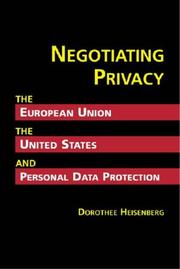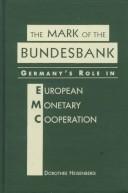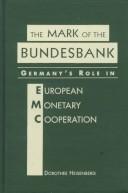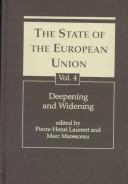| Listing 1 - 9 of 9 |
Sort by
|
Book
ISBN: 9781685851811 1685851819 Year: 2023 Publisher: Boulder
Abstract | Keywords | Export | Availability | Bookmark
 Loading...
Loading...Choose an application
- Reference Manager
- EndNote
- RefWorks (Direct export to RefWorks)
With the Bundesbank now the dominant German actor in international monetary cooperation, Germany’s partner states have begun to consider the requirements of the bank—rather than the government—paramount. Dorothee Heisenberg maintains that the evolution of the Bundesbank is key to understanding how and why Europeans chose to achieve monetary union. Heisenberg demonstrates that the domestic relationship between the Bundesbank and the German government is a significant determinant of cooperation at the European level. Drawing on historical evidence from 1968 to the present, she reveals that the bank has at times been willing to change its domestic monetary policies solely on the basis of the international situation. Similarly, it has become increasingly likely to challenge the government’s monetary policy, and was the primary force in negotiating EMU.

ISBN: 1588263800 1626370079 9781626370074 9781588263803 Year: 2005 Publisher: Boulder (Colo.) Rienner
Abstract | Keywords | Export | Availability | Bookmark
 Loading...
Loading...Choose an application
- Reference Manager
- EndNote
- RefWorks (Direct export to RefWorks)
How did the European Union come to be the global leader in setting data privacy standards? And what is the significance of this development? Dorothee Heisenberg traces the origins of the stringent EU privacy laws, the responses of the United States and other governments, and the reactions and concerns of a range of interest groups. Analyzing the negotiation of the original 1995 EU Data Protection Directive, the 2000 Safe Harbor Agreement, and the 2004 Passenger Name Record Agreement, Heisenberg shows that the degree to which business vs. consumer interests were factored into governments' positions was the source not only of U.S.-EU conflicts, but also of their resolution. She finds, too, that public opinion in Europe and the U.S. has been remarkably similar--and thus cannot account for official U.S. reaction to the issues raised by the EU privacy directive. More broadly, Negotiating Privacy sheds important light on both the relationship between the U.S. and the EU and the relationship between domestic issues and the development of international rules.
Data protection --- Records --- Privacy, Right of --- Protection de l'information (Informatique) --- Archives --- Droit à la vie privée --- Law and legislation --- Droit --- USA -- 340.7 --- EU COUNTRIES -- 340.7 --- Droit à la vie privée --- Data protection - Law and legislation - European Union countries --- Records - Law and legislation - European Union countries --- Privacy, Right of - European Union countries --- Data protection - Law and legislation - United States --- Records - Law and legislation - United States --- Privacy, Right of - United States --- Acqui 2006

ISBN: 1555876897 1685851819 Year: 1985 Publisher: Boulder Lynne Rienner
Abstract | Keywords | Export | Availability | Bookmark
 Loading...
Loading...Choose an application
- Reference Manager
- EndNote
- RefWorks (Direct export to RefWorks)
DE / Germany - Duitsland - Allemagne --- 333.111.0 --- 333.825 --- 334.151.20 --- 334.151.27 --- 334.151.21 --- 334.150.0 --- Monetary policy --- -European Union --- -332.4943 --- Monetary management --- Economic policy --- Currency boards --- Money supply --- Algemeenheden. Theoretische en beschrijvende studies. Centrale banken. --- Deviezenpolitiek. Interventies. --- Economische en monetaire unie van de Europese Gemeenschappen: algemeenheden. --- Europees monetair stelsel. --- Europese centrale bank. ESCB. Centrale banken. --- Institutionele aspecten EG: algemeenheden. --- Deutsche Bundesbank. --- European Monetary System (Organization) --- Système monétaire européen (Organization) --- Europäisches Währungssystem (Organization) --- Sistema Monetario Europeo (Organization) --- Europees Monetair System (Organization) --- Europæisk monetær system (Organization) --- Euroopan valuuttajärjestelmä --- EMS (European Monetary System) --- E.M.S. (European Monetary System) --- EWS (European Monetary System) --- E.W.S. (European Monetary System) --- SME (European Monetary System) --- S.M.E. (European Monetary System) --- Banque centrale de l'Allemagne de l'Ouest --- Banca federale tedesca --- Banca centrale tedesca --- Bank Deutscher Länder --- 332.4943 --- Algemeenheden. Theoretische en beschrijvende studies. Centrale banken --- Deviezenpolitiek. Interventies --- Institutionele aspecten EG: algemeenheden --- Economische en monetaire unie van de Europese Gemeenschappen: algemeenheden --- Europese centrale bank. ESCB. Centrale banken --- Europees monetair stelsel --- European Union --- E.U.
Digital
ISBN: 9781626370074 Year: 2022 Publisher: Boulder Lynne Rienner Publishers
Abstract | Keywords | Export | Availability | Bookmark
 Loading...
Loading...Choose an application
- Reference Manager
- EndNote
- RefWorks (Direct export to RefWorks)

ISBN: 9781685851811 9781555876890 Year: 2023 Publisher: Boulder Lynne Rienner Publishers
Abstract | Keywords | Export | Availability | Bookmark
 Loading...
Loading...Choose an application
- Reference Manager
- EndNote
- RefWorks (Direct export to RefWorks)
Book

ISBN: 9780857457738 Year: 2007 Publisher: New York Oxford
Abstract | Keywords | Export | Availability | Bookmark
 Loading...
Loading...Choose an application
- Reference Manager
- EndNote
- RefWorks (Direct export to RefWorks)
Digital

ISBN: 9780857457738 Year: 2007 Publisher: New York; ; Oxford Berghahn Books
Abstract | Keywords | Export | Availability | Bookmark
 Loading...
Loading...Choose an application
- Reference Manager
- EndNote
- RefWorks (Direct export to RefWorks)
Book

ISBN: 9781685858230 1685858236 Year: 2023 Publisher: Boulder
Abstract | Keywords | Export | Availability | Bookmark
 Loading...
Loading...Choose an application
- Reference Manager
- EndNote
- RefWorks (Direct export to RefWorks)
The struggle between those who seek a more integrated, and even a federal, Europe and those proposing a looser confederation was once again highlighted at the 1996-1997 Intergovernmental Conference, and reflected in the IGC’s decisions. This fourth volume in the European Community Studies Association's biennial series examines the divisions within the EU in the key areas of the common foreign and security policy, European monetary union, enlargement, and structural reform.


ISBN: 9781685858230 9781555877200 Year: 2023 Publisher: Boulder Lynne Rienner Publishers
Abstract | Keywords | Export | Availability | Bookmark
 Loading...
Loading...Choose an application
- Reference Manager
- EndNote
- RefWorks (Direct export to RefWorks)
| Listing 1 - 9 of 9 |
Sort by
|

 Search
Search Feedback
Feedback About UniCat
About UniCat  Help
Help News
News